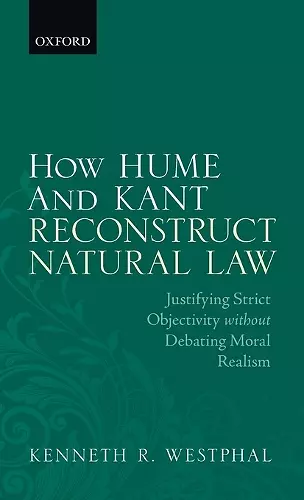How Hume and Kant Reconstruct Natural Law
Justifying Strict Objectivity without Debating Moral Realism
Format:Hardback
Publisher:Oxford University Press
Published:7th Apr '16
Currently unavailable, and unfortunately no date known when it will be back

Kenneth R. Westphal presents an original interpretation of Hume's and Kant's moral philosophies, the differences between which are prominent in current philosophical accounts. Westphal argues that focussing on these differences, however, occludes a decisive, shared achievement: a distinctive constructivist method to identify basic moral principles and to justify their strict objectivity, without invoking moral realism nor moral anti-realism or irrealism. Their constructivism is based on Hume's key insight that 'though the laws of justice are artificial, they are not arbitrary'. Arbitrariness in basic moral principles is avoided by starting with fundamental problems of social coördination which concern outward behaviour and physiological needs; basic principles of justice are artificial because solving those problems does not require appeal to moral realism (nor to moral anti-realism). Instead, moral cognitivism is preserved by identifying sufficient justifying reasons, which can be addressed to all parties, for the minimum sufficient legitimate principles and institutions required to provide and protect basic forms of social coördination (including verbal behaviour). Hume first develops this kind of constructivism for basic property rights and for government. Kant greatly refines Hume's construction of justice within his 'metaphysical principles of justice', whilst preserving the core model of Hume's innovative constructivism. Hume's and Kant's constructivism avoids the conventionalist and relativist tendencies latent if not explicit in contemporary forms of moral constructivism.
In this forcefully argued contribution to the theory of justice, Kenneth R. Westphal looks back to Hume and Kant as reformers of an earlier "natural law" tradition ... This is history of philosophy done right, telling us what people thought some centuries ago, and why we should think the same. It is the admirable work of a mature thinker who is passionate about justifying principles of justice, and about why their justification matters. * Richard McCarty, Notre Dame Philosophical Reviews Online *
ISBN: 9780198747055
Dimensions: 222mm x 144mm x 20mm
Weight: 432g
270 pages